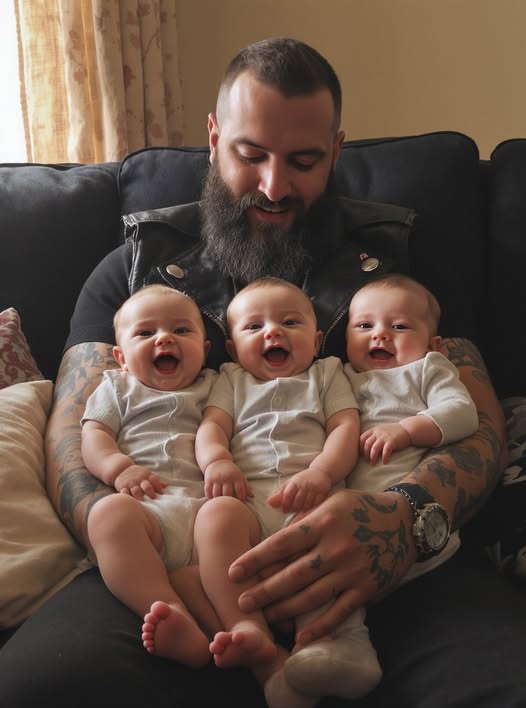When Dez’s phone buzzed during a thunderous motorcycle rally far from home, he barely gave it a glance. His sister Maelis had gone into labor, but she’d told him not to worry—there was still time. “Go have fun. I’ll call when it’s really happening,” she’d joked, waving him off with her usual confidence. Trusting her, he stayed. But fate had other plans. Hours later, Dez got the kind of call that shatters everything: Maelis had died during childbirth, leaving behind not just one baby, but three—Roux, Brin, and Callum.
The world around Dez collapsed. Grief hit like a head-on collision, and before he could even catch his breath, he was thrust into a life he hadn’t imagined in his wildest dreams. No one else stepped up. So Dez—tattooed, leather-jacketed, more comfortable riding highways than navigating hospital hallways—came home not to silence, but to the cries of three motherless newborns. And without hesitation, he stepped in.
He didn’t know what he was doing. But he knew he couldn’t let them down.
The transformation was immediate and jarring. Nights at bars turned into sleepless vigils with baby monitors. He sold his favorite motorcycle to pay for diapers, bottles, and checkups. The kitchen that once only saw takeout boxes now smelled of homemade pasta and pancake breakfasts. His walls filled with school drawings, height marks, and spelling test A’s. For five years, he was their everything—their cook, their chauffeur, their bedtime storyteller. He learned to braid Brin’s hair, find Roux’s favorite sock, and calm Callum during night terrors. He wasn’t always perfect, but he was always there.
Their home wasn’t fancy. The paint peeled. The schedule was chaotic. The furniture didn’t match. But it was full of love. It was real. Neighbors whispered admiration—Dez, the rugged biker, was raising three children with more devotion than most ever dreamed of.
Then, just as life had found its rhythm, the past came knocking.
Vin, the children’s biological father—who had disappeared long before Maelis began showing—suddenly resurfaced. Dressed in a crisp suit and flanked by a social worker named Marianne, he arrived ready to assert his parental rights. He spoke about stability, about biological bonds and proper upbringing. He didn’t mention the years he had missed. Marianne toured the home, scribbling on her clipboard: peeling walls, no structured curriculum, unconventional lifestyle.
Her report came days later. It raised concerns about the children’s emotional development, about Dez’s ability to provide a “standard environment.” For Dez, the words felt like a knife. These kids were his life. But now, red tape and genetics threatened to rip them away.
He didn’t back down. He borrowed money, hired a lawyer, and braced himself for court. On the stand, he didn’t dress up the truth. He didn’t call himself a hero. He just spoke from the heart. He told them how Brin cried for her mom and how he cried with her. How he’d held Roux through a 104-degree fever, terrified but steady. How Callum still called out for Maelis in his sleep. He confessed his fears, his failures—but above all, his unwavering presence.
Then something no one expected happened.
Brin stood up. Ten years old, composed yet trembling, she asked the judge if she could speak. The courtroom hushed.
She didn’t talk about toys or birthdays. She talked about the little things—the grilled cheese on bad days, the way he held her hand through nightmares, the time he combed her hair with trembling fingers because he didn’t know how, but he tried anyway.
“He’s not just our uncle,” she said through tears. “He’s our dad. He didn’t walk away. He stayed.”
The room went still. The judge took a long pause before delivering the verdict. Full custody to Dez. Not because of biology, but because of love. Because he showed up—every day, without fail—and gave those children a home rooted in compassion, safety, and commitment.
That night, back in their messy, love-filled house, Dez made grilled cheese while Brin set the table. Roux danced barefoot down the hallway. Callum napped on the couch, still clutching his toy motorcycle. Laughter rang through the air like music.
In that moment, Dez finally let go of the breath he’d been holding for five years. He wasn’t just a biker or a brother. He was a father, in the truest, deepest sense.
Because family isn’t measured by blood—it’s built through showing up, through choosing love, again and again.
